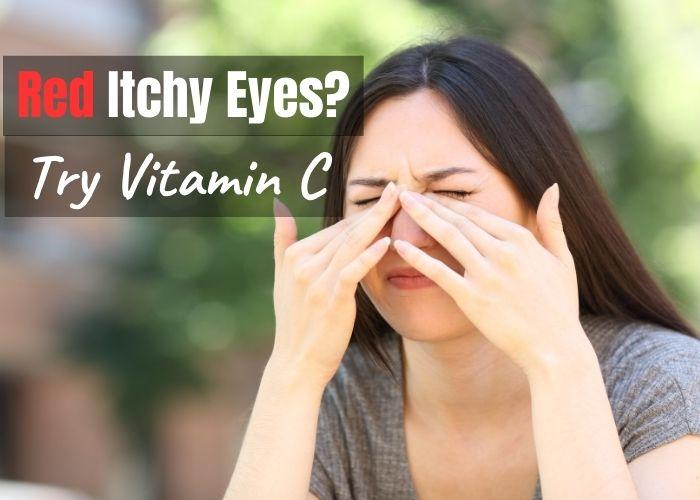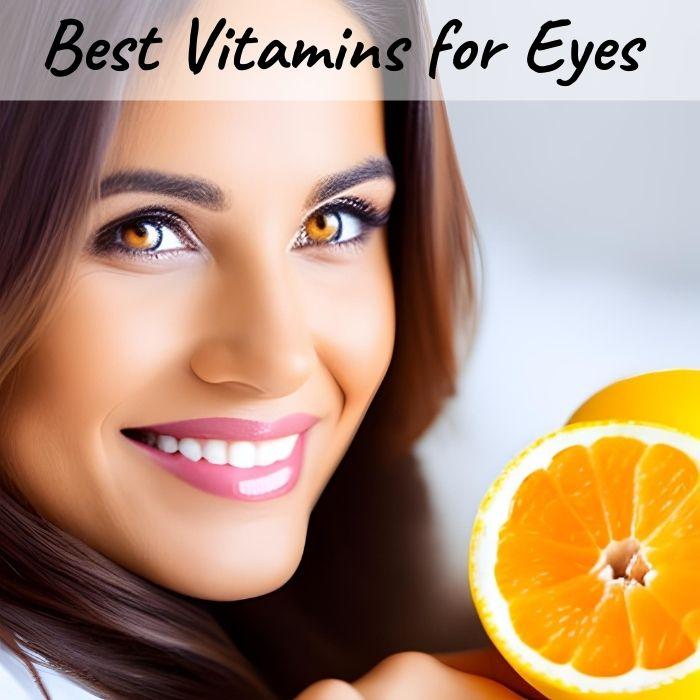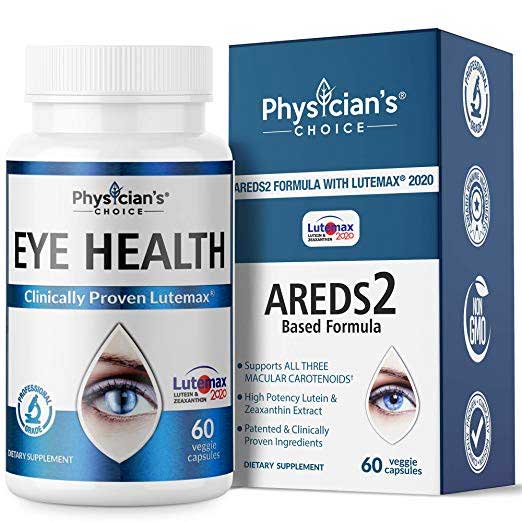One common symptom that can come with allergies is eye discomfort, such as redness, itchiness and excessive tearing. But is there a home remedy for red itchy eyes that actually works?

You can easily find over-the-counter medications and home remedies can provide some relief. However, you may already have Vitamin C in your kitchen cabinet at home, which may be an even better option. Let’s see how this low-cost, natural supplement works – and why it may be worth trying…
Clinical Studies: Unveiling the Power of Vitamin C
Numerous clinical studies have investigated the role of Vitamin C in reducing allergy-related eye symptoms, shedding light on its efficacy.
For example, the Journal of Ophthalmology published a study looking at the effects of Vitamin C on allergic conjunctivitis. Conjunctivitis is a common condition causing eye inflammation. The researchers found that participants who received Vitamin C supplementation experienced a significant reduction in redness, itching, and tearing compared to the control group[^1].
In addition, the Journal of Allergy and Clinical Immunology published a report suggesting that Vitamin C intake can help alleviate ocular symptoms associated with hay fever[^2].
Furthermore, University of Michigan researchers analyzed the outcomes of multiple studies and concluded that Vitamin C supplementation can potentially improve allergic conjunctivitis symptoms and quality of life[^3].
Overall, these studies highlight the promising role of Vitamin C in providing relief for eye symptoms caused by allergies.
Pros & Cons of Using Vitamin C for Allergies:
Advantages of Using Vitamin C for Allergies:

Natural and Safe: Vitamin C is a natural nutrient found abundantly in fruits and vegetables. It is generally safe to consume in appropriate amounts and rarely causes adverse effects when taken orally or applied topically to the eyes.
Anti-inflammatory Properties: Vitamin C has potent anti-inflammatory properties. Therefore, it can help reduce eye redness and swelling caused by allergic reactions.
Antioxidant Effects: Just like other antioxidants (ie lutein, beta carotene and zeaxanthin), Vitamin C helps fight oxidative stress. Consequently, it can reduce the severity of allergic symptoms.
Disadvantages of Using Vitamin C for Allergies:
Varied Results: While clinical studies demonstrate the potential benefits of Vitamin C for allergy relief, individual responses may vary. It may work well for some individuals but have limited effects for others.
Dosage and Form: Determining the appropriate dosage and form of Vitamin C for optimal results can be challenging. Consulting a healthcare professional is advisable to ensure safety and effectiveness.
Vitamin C VS Other Allergy Treatments:
Compared to other home treatments and over-the-counter medications for eye symptoms due to allergies, Vitamin C offers unique advantages:

1. Non-Drowsy: Unlike certain antihistamines, Vitamin C does not cause drowsiness. Therefore, this nutritional supplement offers a better solution for people who need to stay alert and focused.
2. Holistic Approach: While over-the-counter medications mainly address the symptoms, Vitamin C’s antioxidant and anti-inflammatory effects offer a more holistic approach by targeting the underlying mechanisms of allergies.
3. Cost-Effective: Vitamin C generally costs less that many over-the-counter medications.
FAQ About Vitamin C for Allergic Eye Conditions:
Recent trends have shown an increasing interest in natural remedies for allergy relief. People are turning to nature’s bounty, like Vitamin C, to complement their conventional treatments. Here are a few common questions about Vitamin C and allergies:
Q: Can I obtain enough Vitamin C through my diet alone?
A balanced diet containing fruits and vegetables provides some Vitamin C. That said, you may need to supplement to achieve optimal levels for therapeutic purposes. (Talk to your healthcare provider.)
Q: Are there any side effects of using Vitamin C for allergies?
Vitamin C is generally safe when consumed within the recommended dosage range. However, high does can sometimes result in mild gastrointestinal disturbances, like diarrhea.
Q: Can I apply Vitamin C directly to my eyes?
Applying Vitamin C directly to the eyes is not recommended. Instead, oral supplementation or consuming foods high in Vitamin C can provide systemic benefits.
Q: Can Vitamin C completely cure my allergies?
A: While Vitamin C can provide allergy symptom relief, it does not cure allergies. Allergies are complex immune responses, and treating them requires a comprehensive approach that may involve multiple strategies, including avoidance of allergens and appropriate medical interventions.
Q: Can I take Vitamin C supplements with my other allergy medications?
A: In most cases, it is safe to take Vitamin C supplements alongside other allergy medications. That said, check with your doctor for your specific health situation.
Q: Which foods contain high amounts of Vitamin C?
A: Including Vitamin C-rich foods in your diet can be beneficial. For example, red peppers, oranges, strawberries, kiwifruit and broccoli all have over 50% of the RDA per serving.

Q: How long does it take for Vitamin C to affect eye allergy symptoms?
A: The time it takes to experience the effects of Vitamin C on eye allergy symptoms may vary among individuals. You may see symptoms diminish within a few days, although it can sometimes take longer. Consistent and regular use is important for optimal results.
In Summary:
Vitamin C has emerged as a potential natural solution for alleviating eye symptoms caused by allergies. Its anti-inflammatory and antioxidant properties can help reduce many common allergic reactions. While individual responses may vary, incorporating Vitamin C into your allergy relief regimen can provide a non-drowsy, cost-effective, and holistic approach. Also, consult with your doctor first before making changes to your supplement routine.
References:

